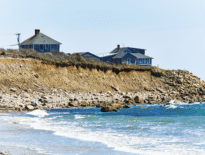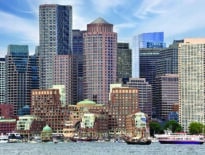Owners of Charlestown’s 20-acre Hood Park are ready to take the next step in its transformation with plans for a 160-room hotel and 90-unit residential building.
The 15 and 25 Supertest St. project would include a substation and distribution facility to upgrade the electric grid in Charlestown and northern neighborhoods in Boston, developers said in a Boston Planning & Development Agency filing.
The combination hotel and residential building would be 215 feet tall, or roughly 21 stories, according to a letter submitted by Boston-based development consultants Trademark Partners.
The 260,000 square-foot building would include ground floor restaurant and retail space, and 224 underground parking spaces. A 1-acre Hood Green park also is part of the plan.
To comply with Boston’s inclusionary development policy, developers propose locating the required 20 percent affordable unit component in a separate building at 15 Supertest St. in partnership with an affordable housing specialist.
The 45-foot-tall building would include 18 income-restricted apartments, all containing three or four bedrooms, 24,000 square feet of retail space and 215 underground parking spaces.
As proposed, the project exceeds the current master plan approved for the park by 77,500 square feet.
The former dairy plant was converted into a business park in the 1990s. The Kaneb family, owners of the HP Hood dairy company, have been gradually adding new office, lab and residential space over the past decade. The park now contains nearly 1.1 million square feet of commercial and multifamily buildings.
The next project also would include an enclosure for a new electrical substation designed to improve the capacity and reliability of the local grid.
Building industry groups have warned that the push to decarbonize building systems will require upgrades to the region’s electric grid to support growing demand for electric heating and cooling systems.
Boston is implementing its Building Emissions Disclosure and Reduction Ordinance, which requires larger commercial and multifamily buildings to shift away from fossil fuel-based building systems, purchase renewable energy credits or pay a fine to the city.
In June, a compliance board began reviewing individual property owners’ requests for exemptions from the schedule to meet the ordinance’s requirements.









